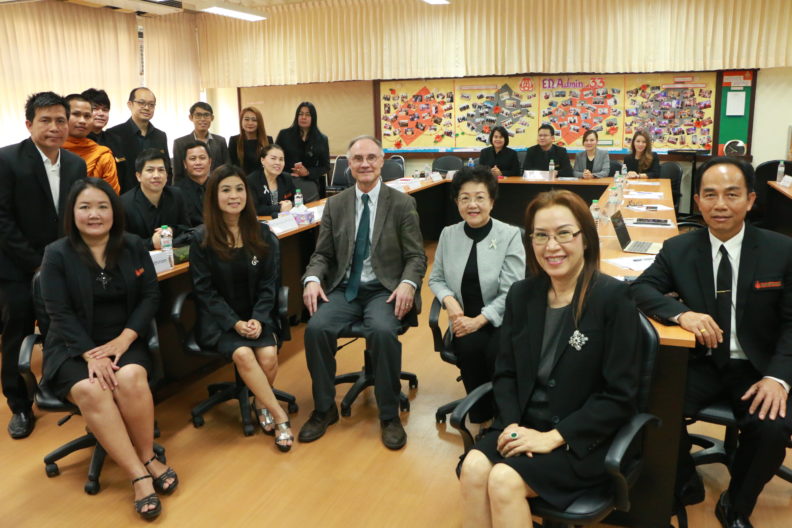Our continued partnership with Khon Kaen University
b.chapmanI am now back from Khon Kaen, Thailand. Recall that the college has had a formal partnership with the Faculty of Education at Khon Kaen University (KKU) for 15 years. I usually like to communicate about college international trips while I am there. In this case, I simply had no time. As part of this trip, Paula Groves Price and I provided keynote addresses to an international curriculum conference being held in Khon Kaen. As part of the meeting, we also listened to graduate student presentations and provided formal feedback for master and doctoral students. In addition, we provided workshops for graduate students that lasted the better part of two days.
Getting to Khon Kaen is no simple task. Flights from Spokane to Seattle, Seattle to Tokyo, Tokyo to Bangkok, and Bangkok to Khon Kaen are required. Those that do the trip know just how demanding the travel is and it is a bit of a bond we share with our Khon Kaen colleagues who travel to WSU. The only way these relationships survive is if individuals from both places are willing to do this travel. We met with Khon Kaen University’s vice president of international affairs, as well as its president. Many university partnerships exist in name only, and little is actually done. Both these Khon Kaen administrators expressed gratitude for this international partnership actually being one of action.
When KKU faculty and students visited WSU last April, we signed another five-year Memorandum of Understanding (MOU), which governs the relationship. The visit by Paula and me marked the first set of activities under the new and expanded MOU with KKU. In the past, educational administration was the focus for KKU and WSU. For this trip, educational administration, as well as curriculum and instruction, were the foci for this trip. We toured their Autism Research Center and Demonstration School on campus and discussed yet other possibilities for the future.
Thailand is a developing country and one of contrasts. This is no more apparent than in Khon Kaen, the seat of commerce and government for the northeast region of Thailand. When I visited there in 2001, I saw a Mercedes Benz, a couple of elephants, and a family of four riding on a Honda 90, with none of the riders wearing a helmet. Last year, and in this visit, I saw a good deal of development, with new housing units along a lake in the downtown, and many new buildings. No elephants were seen this time, nor a Mercedes Benz. I did see several big, new SUVs (further signs of overall development) and more people wearing helmets, which is now the law. Still, there were plenty of families traveling in Khon Kaen on one small motorcycle without any protective gear. The hotel we stay at is very nice. A short walk down a street with several bars and restaurants and you’ll see a Starbucks. Visible from our 11th floor room are dwellings with people living in abject poverty.
Whatever we do as a college for KKU is warmly embraced and lauded by faculty and administrators. We really feel appreciated for the work we do and, in some small way, feel like we are making the world a better place, though I want to be careful not to overstate what we offer. In short, this is simply land-grant university work. I hope that the college will continue this partnership for years to come. Given the relationship and the accomplishments thus far, I think this partnership can be a signature international collaboration for the college.
On our trans-pacific flight there, we flew into the jet stream. I like reading the flight data that is provided for each passenger. On this flight, the head wind in mph was given, along with the ground speed and air speed. This reminded me of my high school teaching days. Many of you know that I use to be a high school mathematics teacher. When I taught algebra, I used to develop algebra problems like: “You are traveling in an airplane at X mph and facing a head wind of Y mph. You need to travel Z miles. How long will it take you to get there?” I suspect many of you might remember knocking your brains out trying to solve these problems! J Anyway, on the way back, we traveled with the jet stream at about 800 mph and at about 40,000 feet. Incredible.
KKU faculty and students will be in Pullman in April. I hope each one of you takes the opportunity to introduce yourself and visit with them. Please help make them feel welcome. Paula has a variety of activities planned so there are times to jump in and meet people. As this partnership continues to expand, Paula will be reaching out to faculty to work with KKU. Perhaps a trip to Khon Kaen will be required. Strongly consider this opportunity. While the work can be challenging and the hours long, you will not regret your involvement. I predict you will be changed by the experience.






